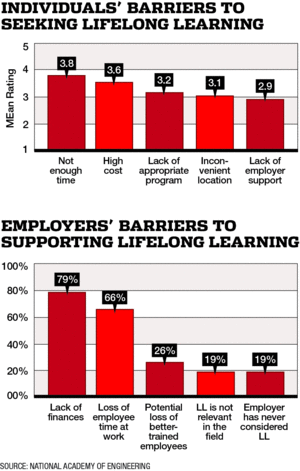
Matt Collins, the 50-year-old manager of construction operations for Jacobs Engineering Group in Seattle, manages about 60 people in a workweek that can stretch to 60 hours on big-ticket municipal transportation and wastewater construction projects.
The father of two young children also is earning—online—a master of engineering degree in professional practice at the University of Wisconsin, Madison. “I always wanted to do it,” says Collins. “The biggest obstacle was finding the time, but this program has given me enough flexibility to make it work.”
Collins says the degree program, which he started at a different firm, was a factor in winning his current job. He says he has gained many insights to use in leading teams at Jacobs from working with fellow students in diverse disciplines and locations.
“It's great to look outside the industry to see what works,” says Collins. “It pulls you back into a broader industry view and reminds you of how to approach problems and how to think.”
Engineers have always sought to update their learning, whether it is mandated through licensing, to improve job prospects or keep up with industry needs.
“Lifelong learning” (LL) is a criterion in accrediting many university engineering programs. “We expect that students have acquired the ability to engage in lifelong learning,” says Joseph Sussman, director of accreditation and chief information officer of the Accreditation Board for Engineering and Technology. Jesus de la Garza, construction engineering and management professor at Virginia Polytechnic and State University, Blacksburg, says schools “must provide evidence as part of our certification.”
More universities and other learning providers are reaching out to practitioners at all career stages, and employers see value in offering or supporting lifelong learning as a retention tool. Many are taking advantage of new technologies to expand offerings in scope and reach.
“We are all lifelong learners, and universities like ours have to think about how we can help the adult learners in the future,” says Jeffrey Russell, former dean of the University of Wisconsin civil engineering department who was just named to a new position as the school-wide vice chancellor of lifelong learning and dean of continuing studies.
“The college degree will not mark the end of a relationship but rather the passing of one phase of that relationship to another.” He says 4.6 million higher-education students take at least one online course per semester and that those over 25 years old represent the “majority of the student population in higher ed today.”
But there is growing concern that LL's appeal is still losing steam among engineers who are under the pressures of busy lives and downturn impacts and that not keeping pace with rapidly changing technology and global needs has become a key factor in the loss of U.S. economic competitiveness.
“Lifelong learning is important because technology and entire industries change substantially over increasingly short periods of time,” says Charles Vest, president of the National Academy of Engineering (NAE). “Hopefully, we all learn on the job, but more than that is required for many individuals if they are to be vital and keep our industries vital.” He says the LL “tradition” is stronger in executive education and medicine. “Perhaps this sufficed when the pace was slower and we were not in constant, flat-out global competition, but it doesn't suffice today,” says Vest.




Post a comment to this article
Report Abusive Comment